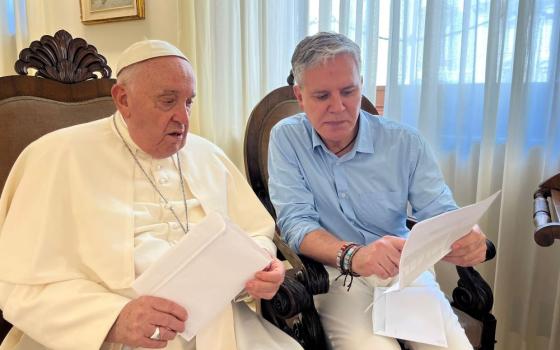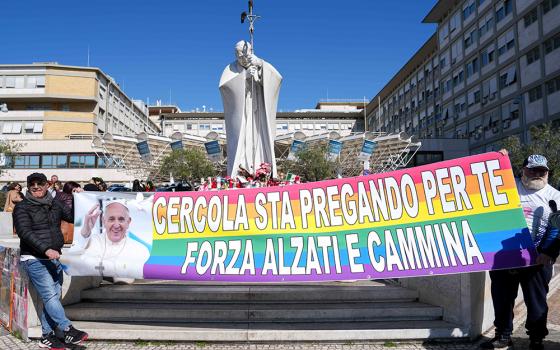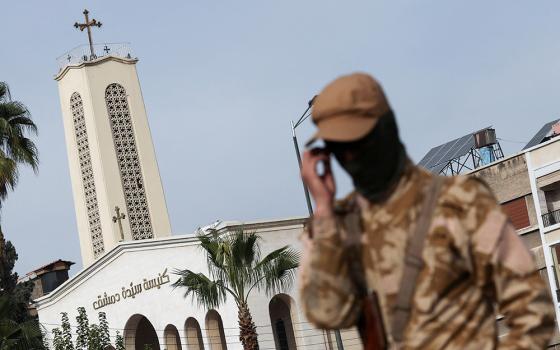
Jesus is depicted in a life-size Way of the Cross by stone carvers from the Artesanos Don Bosco in Huaraz, Peru. (CNS/Barbara Fraser)
We've probably all heard the story of this little girl we call Angelica, whose whole name is Michelle Angelica. She's aspiring to become a great artist. One day, Angelica spread out all her crayons and bent over a large piece of paper. For a long time, she worked and concentrated as hard as she could. When her older brother came by and asked what she was doing, she replied, "I'm drawing a picture of God." The brother smirked and said, "Nobody knows what God looks like!" Angelica simply replied, "They will when I'm finished!"
While we may have never tried to draw God's picture, we all have implicit images of God, some of which we have articulated, some of which are all the more powerful for not having been brought to consciousness. Our hymns, religious art and the prayers we've learned have all subtly shaped our theology from the time we could focus or understand the words we heard.
One way we might uncover our implicit theology is by asking what we pray for and what we expect from prayer. We can learn a lot by questioning our theology in the mode of a 5-year-old. What do we think God does all day, and what do we ask God to do?

(Mark Bartholomew)
When we demand punishment for crime or strive to learn someone else's language, we are unconsciously putting our theology on display. Our day-to-day activities and choices demonstrate what we see as the meaning of life and indicate what we think God is concerned about. That's the idea behind what Paul told the Philippian community when he said to them: "Have in you the same attitude that is also in Christ Jesus." Paul went on to quote a well-known hymn that proclaimed the scandalously new image of God that they had encountered in Christ.
The very first line proclaimed the essence of Christian faith. Christ Jesus was in the form of God. That is to say: "If you want to know what God looks like, look to this man." The next line gets to the scandal of the Christian revelation: He "did not regard equality with God something to be grasped." That means that Christ was unconcerned about looking like what people thought God should look like. His mode of portraying God in human form had nothing to do with shows of power or imposing dignity. In fact, it was the very opposite.
Throughout his ministry, Jesus had tried to impart this idea to his disciples. They were fine with the idea that he was God's representative, but they had their own concept of what that should look like. Writing 20 or 30 years after Jesus' death, Paul used this hymn that shows how the community was coming to understand Christ's life and message.
Advertisement
This hymn tells us that the God revealed in Jesus is more self-emptying than majestic. We think of power as the ability to control. But this new way describes divine power as the willingness to be in solidarity with humanity, even or especially in the direst of circumstances.
Paul says, "He humbled himself, becoming obedient to the point of death." This indicates that to be divine is to be humble. It also explains Jesus' obedience as full communion with the Father whose desire was simply to share life with humanity. Jesus was divine and human, and his life portrayed self-giving as God's constant activity and humanity's greatest possibility.
The last part of the hymn is the confirmation. Christ's way of giving himself, of remaining true even through the most degrading maltreatment humanity could invent, was the most perfect portrait of the self-giving God that history will ever know. Because of that, Paul says, God exalted him.
This is heady stuff. It requires all the concentration we can give it. This song proclaims the theory, the theology. We may be able to sing it. We probably ought to measure our other hymns in its light. But we need the Gospels to see it fleshed out — not only the Gospels but the lives of our Christian community, past, present and future.
That's exactly what Paul was telling the Philippians. You know what Christ was like. You know how he revealed that God's activity is an eternal self-giving, no matter the response. Therefore, go and do likewise! Let that love come alive in you! Forget your petty egoism and vanity. Show the world what divinity looks like! In the process, you will become all you were created to be.
[Mary M. McGlone, a Sister of St. Joseph, is currently writing the history of the Sisters of St. Joseph in the U.S.]






